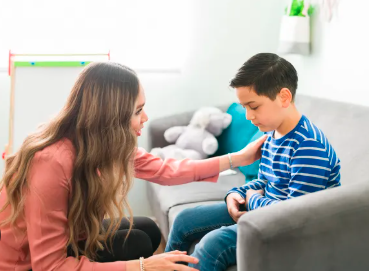Mental health is just as important as physical health—and this truth applies to children as well. Talking to kids about their emotions, thoughts, and mental well-being helps them build resilience, understand themselves better, and seek help when needed. Yet, many parents and guardians struggle with how to start the conversation.
In this article, we’ll cover how to talk to children about mental health in an open, age-appropriate, and supportive manner, ensuring that they feel heard, understood, and safe.
Why It’s Important to Discuss Mental Health with Children
Early Awareness Builds Emotional Intelligence
When children understand that emotions are normal and manageable, they are more likely to:
- Express themselves openly
- Seek help when struggling
- Show empathy to others
- Build stronger self-awareness
Reduces Stigma from an Early Age
Discussing mental health early teaches children that emotional struggles are not shameful and that it’s okay to talk about feelings.
Signs Your Child May Need a Mental Health Conversation
Before initiating a talk, look for changes in behavior, such as:
- Withdrawal from friends or family
- Sudden mood swings or aggression
- Changes in eating or sleeping habits
- Declining performance in school
- Frequent complaints of stomachaches or headaches
- Loss of interest in activities they once enjoyed
How to Prepare for the Conversation
1. Choose the Right Time
Pick a calm, distraction-free environment—perhaps during a walk, bedtime, or after a shared activity.
2. Use Open-Ended Questions
Instead of asking, “Are you okay?” try:
- “How was your day?”
- “What made you feel happy or sad today?”
- “Can you tell me more about what happened at school?”
3. Be Calm and Non-Judgmental
Your tone and body language matter. Avoid interrupting or jumping to conclusions. Let your child speak freely.
Age-Appropriate Ways to Talk About Mental Health
For Young Children (Ages 3–7)
- Use simple, clear words (e.g., “Sometimes people feel sad or angry, and that’s okay.”)
- Relate emotions to physical feelings (“Do you feel a tummy ache when you’re nervous?”)
- Read books or use toys to model emotions and responses
- Encourage labeling feelings: happy, sad, scared, tired
For Older Children (Ages 8–12)
- Help them recognize complex emotions like stress, loneliness, or embarrassment
- Use real-life examples from school or media
- Discuss coping tools like journaling, drawing, or talking to a trusted adult
- Encourage questions and validate their experiences
For Teenagers (Ages 13+)
- Be open about mental health issues like anxiety or depression
- Ask about peer pressure, social media, and school stress
- Encourage professional support if needed
- Share your own experiences when appropriate (without overwhelming them)
What to Say (and What Not to Say)
Things to Say
- “It’s okay to feel this way.”
- “I’m here to listen, not to judge.”
- “You’re not alone. We can figure it out together.”
- “It’s brave to talk about your feelings.”
Avoid Saying
- “You’re too young to worry about this.”
- “Just be happy.”
- “You’re overreacting.”
- “Other kids have it worse.”
Creating a Safe and Supportive Environment
Practice Active Listening
Give your full attention. Use phrases like:
- “That sounds really hard.”
- “Thank you for sharing this with me.”
- “I’m proud of you for talking about this.”
Normalize Mental Health Conversations
- Talk about emotions during regular routines
- Praise emotional honesty
- Watch family shows or read stories that include mental health themes
When to Seek Professional Help
Sometimes, children need more than just a conversation. Seek help if:
- Symptoms persist for more than two weeks
- Your child talks about wanting to hurt themselves
- You notice extreme changes in behavior or personality
- School, friendships, or routines are heavily affected
Consider a child psychologist, counselor, or pediatric therapist for evaluation and guidance.
Tools and Resources for Parents
| Resource | Purpose |
|---|---|
| Books like “The Color Monster” | Helps children identify emotions |
| Apps like Headspace for Kids | Teaches mindfulness and breathing |
| Websites like NIMH.gov | Offers guides for mental wellness |
| School counselors or psychologists | Provide local support and screening |
Conclusion
Talking to children about mental health isn’t a one-time event—it’s an ongoing, open dialogue. By creating a safe environment and using age-appropriate strategies, you can help your child understand their feelings, manage emotional challenges, and grow into a mentally healthy adult. Remember, your support today shapes their future resilience and confidence.
8 Frequently Asked Questions (FAQs)
1. At what age should I start talking to my child about mental health?
As early as 3 years old. Use simple language to talk about emotions like happy, sad, or angry.
2. How can I tell if my child is struggling mentally?
Look for signs like withdrawal, sleep problems, excessive worry, or sudden behavior changes.
3. What if my child doesn’t want to talk?
Give them time. Let them know you’re always available, and try using creative ways like storytelling or drawing to connect.
4. Is it okay to talk about mental illness with kids?
Yes, in age-appropriate terms. It helps reduce stigma and builds understanding.
5. How do I explain therapy to a child?
Explain that therapy is a safe place where people talk about feelings and learn how to feel better.
6. Can school stress affect my child’s mental health?
Absolutely. Academic pressure, bullying, and peer expectations can lead to anxiety or low self-esteem.
7. Should I hide my own emotions from my child?
No. Modeling healthy emotional expression helps children learn to manage their own feelings.
8. Where can I find help if I’m worried about my child’s mental health?
Reach out to a pediatrician, school counselor, or child psychologist. Online resources like the CDC and mental health nonprofits also offer guidance.









